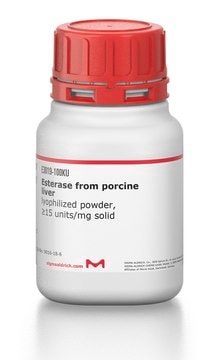F8649
Formate Dehydrogenase from Candida boidinii
lyophilized powder, 5.0-15.0 units/mg protein
Synonym(s):
FDH, Formate:NAD+ oxidoreductase
Sign Into View Organizational & Contract Pricing
All Photos(2)
About This Item
Recommended Products
biological source
fungus (Candida boidinii)
Quality Level
form
lyophilized powder
specific activity
5.0-15.0 units/mg protein
composition
Protein, 5.0-20.0% biuret
storage temp.
2-8°C
Looking for similar products? Visit Product Comparison Guide
Application
Formate Dehydrogenase (FDH) is used for diagnostics in large scale industrial processes. Its used in the production of an unnatural amino acid, tert-L-leucine, a component of some HIV protease and matrix metalloprotease inhibitors.
Biochem/physiol Actions
Formate dehydrogenase is an abundant enzyme from yeast Candida boidinii (CbFDH) that plays an important role in the energy supply of methylotrophic microorganisms and in the stress response of plants.
Formate dehydrogenase is involved in the stress response of plants and catalyzes the reduction of NAD+ to NADH.
Unit Definition
One unit will oxidize 1.0 μmole of formate to CO2 per min in the presence of β-NAD at pH 7.6 at 37 °C.
Signal Word
Danger
Hazard Statements
Precautionary Statements
Hazard Classifications
Resp. Sens. 1
Storage Class Code
11 - Combustible Solids
WGK
WGK 3
Flash Point(F)
Not applicable
Flash Point(C)
Not applicable
Personal Protective Equipment
dust mask type N95 (US), Eyeshields, Gloves
Certificates of Analysis (COA)
Search for Certificates of Analysis (COA) by entering the products Lot/Batch Number. Lot and Batch Numbers can be found on a product’s label following the words ‘Lot’ or ‘Batch’.
Already Own This Product?
Find documentation for the products that you have recently purchased in the Document Library.
Customers Also Viewed
Do reactive oxygen species or does oxygen itself confer obligate anaerobiosis? The case of Bacteroides thetaiotaomicron.
Khademian, et al.
Molecular Microbiology, 114, 333-347 (2021)
Held in police custody.
A Skelt
Nursing times, 84(4), 50-52 (1988-01-02)
Jana Löwe et al.
Scientific reports, 8(1), 10436-10436 (2018-07-12)
A biotechnological process is reported, which enables an enzymatic reduction without the need for addition of an organic co-substrate for in situ-cofactor recycling. The process is based on merging the fields of enzymatic reductive amination with formate dehydrogenase-based in situ-cofactor
Frances L Shaw et al.
Journal of bacteriology, 194(15), 3814-3823 (2012-05-23)
The food-borne bacterial pathogen Campylobacter jejuni efficiently utilizes organic acids such as lactate and formate for energy production. Formate is rapidly metabolized via the activity of the multisubunit formate dehydrogenase (FDH) enzyme, of which the FdhA subunit is predicted to
Yuan Lu et al.
Applied biochemistry and biotechnology, 167(4), 732-742 (2012-05-18)
To improve the hydrogen productivity and examine the hydrogen evolution mechanism of Clostridium paraputrificum, roles of formate in hydrogen evolution and effects of introducing formate-originated NADH regeneration were explored. The formate-decomposing pathway for hydrogen production was verified to exist in
Our team of scientists has experience in all areas of research including Life Science, Material Science, Chemical Synthesis, Chromatography, Analytical and many others.
Contact Technical Service











